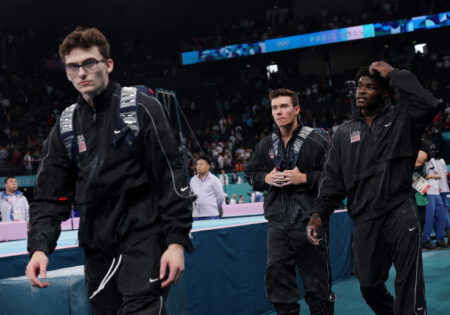At the 2025 Winter Cup, the first major domestic event of the men’s season, Fred Richard’s performance was not defined solely by his routines. The University of Michigan junior and U.S. national team member arrived with a uniform unlike any other on the floor, a deliberate choice in protest of the International Gymnastics Federation’s strict apparel regulations.
Richard had made his stance public before the competition began. The standard men’s uniform, he explained, made him feel “restricted,” “uncomfortable,” and “goofy.” He shared, “Pommel horse pants are basically footed tights,” and the singlet beneath “goes up your crotch and everything.” So, rather than submit to the traditional attire, Richard debuted his own design, knowing it would cost him a 0.3 deduction for each day of competition.
His protest was meticulously prepared.
Richard commissioned a designer, gathered input from teammates, and created a Michigan-branded prototype that he felt addressed both comfort and style. “It feels good to wear,” he exclaimed, noting that other competitors responded positively. He also informed officials of his plan before the meet, receiving the recommendation to proceed, take the deductions, and allow his design to be evaluated for safety and presentation.
https://t.co/mpiAwcbSBa pic.twitter.com/vLVFDcXT13
— Gymnastics Now (@Gymnastics_Now) August 8, 2025
Well, the uniform debate is not new. While the FIG requires tight-fitting garments to highlight “the line” of the gymnast’s body and reduce the risk of fabric catching on equipment, the design leaves little to the imagination and often makes young athletes self-conscious. Women in the sport have already expanded their options, with teams such as Germany’s adopting full-length unitards in international competition. Men’s gymnastics, however, has seen no such adaptation.
Evidently, Richard’s decision was more than a fashion statement.
“When I was younger,” he recalled, “people would call it a girls’ sport.” That long-standing stigma, combined with the discomfort of the attire, drove him to make a public stand. In accepting a scoring penalty, Richard turned his routines into a broader message that athletes should have the choice to compete in apparel that meets modern expectations of comfort, dignity, and performance. Coming forth with a 79.852 score, Frederick Richard challenged too many narratives altogether…
Fred Richard’s risks point to rescuing gymnastics from obscurity
Fred Richard does not appear interested in preserving points if it means preserving the status quo. When he steps onto the competition floor at the upcoming Winter Cup, the Olympic medalist will do so in a modified uniform, one he knows may draw a formal deduction. The decision is deliberate. It is not designed to provoke, but to press the sport toward a direction he believes it must go.
“There will be a new uniform. Yeah, you heard it here first,” he said during an interview with Kensley Behel of Neutral Deductions. The change, he explained, comes after adjustments by Turn, the apparel company supporting his efforts, following feedback from earlier iterations. The stakes are understood. He is not walking into this unknowingly. He is walking in anyway.
Paris 2024 Olympics – Artistic Gymnastics – Men’s All-Around Final – Bercy Arena, Paris, France – July 31, 2024. Frederick Richard of United States reacts after his performance on the Horizontal Bar. REUTERS/Peter Cziborra
The standard penalty, 0.3 per day, is not incidental, particularly in a sport where margins are rarely generous. But for Richard, who has already proven his consistency under the existing system, the question of conformity no longer seems compelling. He has said as much: “If I keep the same old uniform and we make no changes and we try no new things, why are we doing all this work?” It is the same work, after all, that earns teams medals and athletes individual titles. But that alone, in his view, is no longer sufficient. Competence, without evolution, does not hold his interest. Nor, he suggests, does it hold the audience’s.
He does not claim perfect solutions, only the necessity of trial. Richard has watched broadcast numbers remain stagnant, and he has refused to blame the viewer. “If we’re not willing to take risks and try new things—even if they’re not the right things—if we’re not willing to take the risk, why am I dedicating my whole life to this?” The rhetorical clarity of that question underscores what the point deduction cannot erase: A gymnast who is not content to be remembered only for the scores he received.
The post Upset With Gymnastics Federation, US Team Member Revolts With Perfect Response at National Championships appeared first on EssentiallySports.
